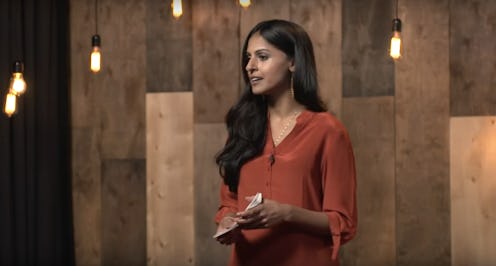Books
8 TED Talks To Change How You Feel About Writing

TED Talks are the most intellectual method of procrastination that society has come up with so far. And there are so many TED Talks out there, on every subject imaginable. So, since you're going to be chain watching TED Talks when you're supposed to be writing anyway, why not watch TED Talks about writing?
TED Talks are popular because they're short, inspiring, and the speaker usually starts with a joke. But they can be more than just a pep talk when you need motivation to finish that novel you've been working on for five years. TED Talks can also challenge your preconceived notions, show you a new perspective, and change the way you think about things.
And there are a lot of preconceived notions about writing. People assume that being a writer means signing up for a life of poverty and delusions of grandeur. Or people believe that there's only one "right" format for "good" storytelling. Or people think that Twitter and texting has ruined the written word as we know it. But these writers, artists, and creators have insights to share that might just change a few minds.
Here are some of the best TED Talks out there that will make you think differently about writers and writing:
1. The Clues to a Great Story by Andrew Stanton
Andrew Stanton is a film director, screenwriter, producer, and voice actor at Pixar Animation Studios. Most of us have seen at least one of his films (Toy Story, A Bug's Life, Monster's Inc, Finding Nemo, and WALL-E, just to name a few), so he doesn't need to prove his writing chops. But in this talk, he starts from the end of his own story and works backwards to show us how a great story comes together, and what makes us care so damn much about the stories we love.
2. Be an Artist, Right Now! by Young-ha Kim
Remember when we were kids, and all the adults encouraged us to draw and write and act? And then we turned eighteen and suddenly it was all "you need a job that earns money so you can buy goods and services"? Author Young-ha Kim wants us all to get back to that child-like state of play and pure creation. He also explains why parents should celebrate their child's first lie.
3. The Danger of a Single Story by Chimamanda Ngozi Adichie
You may know Chimamanda Ngozi Adichie from her novel Americanah, or from her TED Talk "We Should All Be Feminists," or from the Beyonce song that sampled "We Should All Be Feminists." In this talk, she explores the importance of representation in literature. If we don't have diverse books and diverse writers, we will be stuck with a single story—and no one wants to live in a world with only one kind of book.
4. Understanding Comics by Scott McCloud
When we think of writing, we probably think of novels, nonfiction and short stories first, then maybe poetry or screenplays, theatrical plays, journalism, blogging, etc. Writing for comics and graphic novels doesn't always spring to mind. But visual storytelling in comic books needs writers just as much as any other medium. Cartoonist Scott McCloud peels back the curtain to show us the science, philosophy, and history behind even the simplest of comic strips.
5. An Ode to Envy by Parul Sehgal
What do envy and vengeance have to do with writing? More than you might think. Literary critic Parul Sehgal draws connections between jealousy, loneliness, and literature. Would writers even be able to write if we lived in a world free of envy? Maybe, but Parul Sehgal reminds us just how much of writing, on every level, we owe to that good old feeling of stomach-churning envy.
6. Adventures in Twitter Fiction by Andrew Fitzgerald
We scoff at Twitter, we waste time on Twitter, we complain about Twitter. But we rarely talk about the revolution that Twitter has created in writing. Anyone with internet access now has a built-in broadcasting platform. Andrew Fitzgerald talks Twitter, telling stories in the digital age, and how we're facing a new frontier of experimentation with how we write and who we write for.
7. Where Does Creativity Hide? by Amy Tan
Author Amy Tan talks creativity, identity, tragedy, and drawings of poodles. If you've ever wondered where creativity comes from, or why inspiration seems to strike at random, or whether creative geniuses have to be tortured, Amy Tan is here to help you figure it out. She also uses quantum mechanics to explain why all authors are insecure.
8. Txtng is killing language. JK!!! by John McWhorter
Nearly all writing requires some sort of language. And anyone who's ever been to the internet can tell you that modern text lingo is killing language as we know it (at least, a lot of mom blogs seem to think so). Linguist and writer John McWhorter wants to reassure us that texting is not, in fact, destroying the written word. Actually, texting is a pretty fascinating linguistic phenomenon in its own right.
Images: Youtube (9)